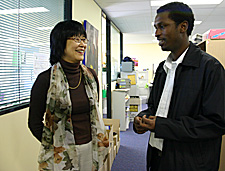 A Sydney Anglican who has first-hand experience of arriving on Australian shores as a refugee fears new federal legislation will mean migrants like herself are no longer welcome.
A Sydney Anglican who has first-hand experience of arriving on Australian shores as a refugee fears new federal legislation will mean migrants like herself are no longer welcome.
Xuyen Tang, a member of Cabramatta Anglican Church, fled her war torn country on a leaky boat to find refuge in Australia more than twenty years ago.
But she believes changes to the Migration Act that aim to excise the Australian mainland from the migration zone will mean migrants won’t receive the same warm welcome she experienced.
The ammendments tabled last week would see all asylum seekers arriving by boat, including those who make it to the Australian mainland, sent to off-shore immigration detention centres to be processed.
Those found to be refugees will be resettled in other countries.
Anglicare, the welfare arm of the Sydney Anglican Diocese, has expressed its grave concern at the proposed changes citing Australia's moral and legal obligation to offer safe haven to those fleeing persecution.
Desperate journey to safe haven
More than twenty years on, Xuyen still vividly remembers the first day she arrived in Australia.
"It was 1979 and I was twenty years old. I remember it was winter and bitterly cold, but I didn't care. I was grateful to be here," she says.
Nine months before she was given refugee status by the Australian Government, Xuyen was in a UN refugee camp in Malaysia fighting for survival.
Her native Vietnam had fallen to the Vietcong four years earlier and fearing for her life under the new communist regime, she fled.
In a leaky fishing boat about half the size of a tennis court, Xuyen travelled with 168 people for more than 7 days without food or water before they ran aground off the shores of Malaysia.
Past generation’s warm welcome
As parliament gets ready to debate the proposed changes to the Migration Act this week, Xuyen says she has been extraordinarily grateful for the generosity of Australians when she arrived in the 1970s.
"A group of Christian students came to visit us when we arrived,” she recalls.
“They were so kind that I remember questioning why they were so good to us. They were educated, well off, and I didn't speak a word of English at the time, hadn't finished my education. I didn't even know how to get a bus ticket.
"But these Australians treated me with such respect and dignity, they made me believe there were people in this world who wanted to do what was good at a time when I thought the world was so wicked," she says.
It was only years later, at an Overseas Christian Fellowship meeting in Sydney that Xuyen came to know that these people loved her because God loved them first.
"Understanding Christ's sacrifice on the cross changed my whole perspective. I came to know that despite our sinfulness, the Creator of the universe loved us and had a purpose for our lives. My world shifted that night. I stopped studying accountancy and enrolled in a Bachelor of Social Work."
Two decades later Xuyen is an active member of Cabramatta Anglican Church and runs Anglicare Migrant Services helping refugees and migrants settle into this country with the support of Anglican churches and the Department of Immigration and Multicultural Affairs.
Anglicare opposes harmful detention
Anglicare Sydney's Chief Executive Officer, Peter Kell says that given Anglicare's history in assisting with the resettlement of refugees in Australia, the organisation knows first hand just how vulnerable people and particularly women and children who have fled persecution and oppression are.
"We have already seen over the last several years how mandatory detention, and particularly off-shore detention, has served to only exacerbate the trauma that asylum seekers have experienced in their countries of origin," says Mr Kell.
"These proposed changes to the Migration Act will only see this increase with even more people, including women and children, detained overseas indefinitely and denied access to a fair and impartial review process through the Refugee Review Tribunal.
"Whilst claims for asylum must be assessed, we must not further diminish Australia's long reputation as a compassionate nation and a good global citizen."























